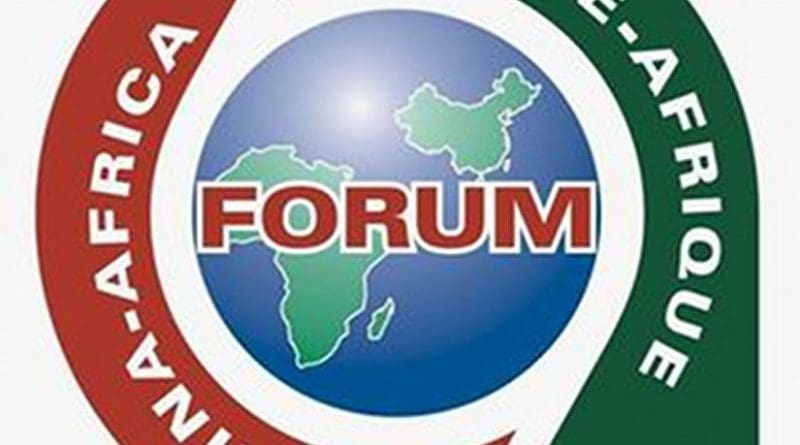China Looks To Africa To Reduce Trade Dependence On US – Analysis
By Manohar Parrikar Institute for Defence Studies and Analyses (MP-IDSA)
By Anand Kumar*
China recently organized the Forum on China-Africa Cooperation (FOCAC) summit in Beijing from 3-4 September 2018. The main objective of the summit was to intensify China’s economic relationship with Africa. This summit was held at a time when China is facing a trade war with the United States. Donald Trump has made his intention clear that he wants to rejuvenate the American economy. He thinks that one way of doing it is by imposing tariffs on Chinese goods which are able to come into America by “manipulation of currency” and are hurting American economy. Trump has also adopted similar measures towards his European and NAFTA partners. He has been quite successful in reviving the American economy but his restrictive policies have also increased concerns of his trading partners including China.
As the US remains China’s largest trading partner, any restrictive trade policy the former adopts is going to adversely affect the Chinese economy. China, which has the ambition of becoming the largest economy of the world at the earliest possible time, has to find a way to meet this new challenge. It appears that it is looking towards Africa as a possible alternative market.
China-Africa trade has grown from a mere USD 765 million in 1978 to 220 billion in 2014. However, it reduced thereafter, reaching USD 170 billion in 2017. Bilateral trade has now once again started picking up and in the first five months of 2018 it gained 17.7 per cent year on year to nearly USD 82 billion.
Nearly 30,000 Chinese companies are active in Africa out of which 300 are major corporations. Chinese companies are involved in a big way in infrastructure building in the continent, which suffers from a major deficit in this sector. China wants to capitalize on this opportunity. It appears that at present only China has either the appetite or capacity to carry out infrastructure building in the continent on a large scale.
Xi Jinping has called this a win-win partnership wherein Chinese companies get lucrative contracts and Africa gets the required infrastructure. There are, however, concerns about this growing Chinese engagement with Africa. Critics suggest that China is thereby engaging in ‘debt-trap diplomacy.’ It is also encouraging corruption and degrading the environment in the continent. But China refutes this allegation and says that this is a US attempt to constrain China by vilifying it.
The Chinese argue that their investments come with ‘no political strings attached.’ But this is also the reason why China is able to sell all kinds of projects at exorbitant prices to Africa. The costs of Chinese projects are under the scanner. It is believed that the Chinese are charging three times the cost of what a project actually costs. Moreover, while the Chinese may not be attaching political strings, they do attach economic strings.
To refute the allegation that it is following debt trap policy, China says that it is not a major creditor to Africa. The continent’s total debt burden is about USD 6 trillion. Most of this is owed to organizations such as the World Bank, the IMF and the Paris Club dominated by Western nations. Chinese loans are a small portion of the total loans disbursed throughout Africa. But it is also true that Chinese loans have been increasing in recent times. China plans to invest nearly a trillion dollars in the next twelve years in Africa.
To be sure, the way China Africa cooperation has played out has raised concerns about debt, corruption and environmental degradation. The problem of debt is acute in Zambia, Djibouti and the Democratic Republic of Congo (DRC). Often this debt situation is ambiguous and countries like DRC don’t even know how much money they owe to China. The president of DRC actually visited China just to know the amount of debt his country has to repay. Yet, a strong defence of Chinese economic engagement in Africa came from some top African leaders during the recent FOCAC summit.
Africa has a vast untapped economic potential which China wants to capitalize on. However, it will not be easy for China to grow its business and trade in Africa given the widespread political instability prevalent in some parts of the continent. At the same time, some African economies are doing very well and growing at the rate of six to seven per cent per annum. China is now trying to give more attention to the better managed economies like South Africa, Nigeria and East Africa.
China is quite concerned about its trade prospects with the United States given the economic policies of Trump. In August 2018, Wei Jianguo, former vice minister of commerce of China and current vice president of the China Center for International Economic Exchange, disclosed that in the next five years, China plans to increase the value of its exports to Africa to USD 500 billion annually, and thus use Africa to replace the United States as China’s largest export market. Similar intentions were also expressed by some Chinese officials during the latest FOCAC summit. In this way, China hopes to nullify the impact of Trump’s economic measures.
China may or may not succeed in transforming Africa into a substitute market. If it does, the bilateral trade relationship is likely to become more unbalanced and tilted in its own favour leading to greater exploitation of Africa. What is interesting is Africa has been persuaded to move down this path.
*Dr. Anand Kumar is visiting professor and chair (India Studies) in the Department of Political Science and Public Administration in the University of Dar-es-Salaam, Tanzania
Views expressed are of the author and do not necessarily reflect the views of the IDSA or of the Government of India.

